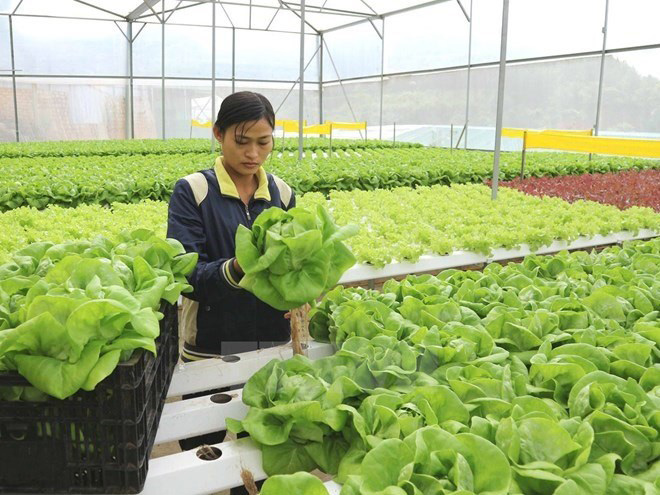



Vegetables grown in a glass house
(Photo VNA)
Hue said that the economy was growing
but uncertainty about the future lingers, given the challenges posed by trade
liberalisation, technological change, the impacts of climate change and
constraints on fiscal and monetary policies.
"There’s no other way but to
transform to an innovation-led growth model and hasten economic restructuring,”
he said. "We’ve talked a lot but little has been done.”
Vietnam has strengths in many
sectors, such as agriculture, the digital economy and tourism. "But if we
choose too many sectors to be spearheads, there will be no spearhead at all,”
Hue said. "Will agriculture be the new driver?”
Hue also expressed concerns about the
lack of linkage between the foreign direct investment (FDI) and domestic
sectors, adding that there was disparity in the developments of the two
sectors.
The policies for attracting FDI must
aim at promoting the domestic sector and establishing value chains to prevent
the development of two sectors in one economy, or even two economies in one
country, he said.
In addition, he said, there is a lack
of indicators to evaluate growth quality, as statistical figures still lacked
reliability.
Tran Dinh Thien, Director of the
Vietnam Institute of Economics, said Vietnam should not chase growth targets
every single year but rather focus on the growth quality of a whole period.
"The new period will need new drivers,” Thien said. "We need comprehensive
changes in thinking and methods.”
Targets should be based on the
international commitments and technology advancements, he added.
Thien added that the most important
goal is building a transparent Government.
According to Sebastian Eckardt,
the World Bank’s Lead Economist for Vietnam, the Vietnamese economy
was experiencing a cyclical uptick in growth accompanied by macroeconomic
stability. But it also faces emerging structural headwinds, including slower
labour force growth, weaker investment and lower productivity growth.
Vietnam should take advantage of
cyclical uptick to strengthen macroeconomic resilience and enhance structural
reforms to boost productivity growth and lift potential growth, he said.
Eckardt said that it was critical to
enhance the business environment, deepen State-owned enterprise reforms and
develop effective factor markets to modernise institutions and create a level
playing field, including for the domestic private sector.
Besides, investing in people and
innovation is important to meet the demands of a modern industrial and
increasingly knowledge-based economy, he said.
According to Nguyen Dinh Cung,
Director of the Central Institute for Economic Management, ministries should
abolish at least one third to half of existing business prerequisites in 2018.
They should also cut in half the number of items subjected to specialised checks
for import and export.
"2018 should continue to be the year
of cost cutting for businesses,” Cung said, adding that further cuts in
interest rates and logistics costs must be put into consideration.
Source: VNA